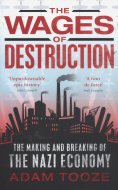|
The Wages of Destruction: The Making and Breaking of the Nazi Economy
|
|
Adam Tooze
|

|

The idea that Nazi Germany was an unstoppable juggernaut, backed up by a highly industrialized economy, has been central to all accounts of the Second World War. But what if this was not the case? What if the tragedy of twentieth-century Europe had its roots in Germany's weakness, rather than in its strength?
Adam Tooze has written the first radically new account of the Second World War in a generation. He does this by placing economics alongside race and politics at the heart of the story. An intuitive understanding of global economic realities was fundamental to Hitler's worldview. He understood that Germany's relative poverty in 1933 was the result not just of the Great Depression but also of its limited territory and natural resources. He predicted the dawning of a new, globalized world in which Europe would be crushed by America's overwhelming power. There was one last chance: a European super-state under German rule.
But the global balance of economic and military power was from the outset heavily stacked against Hitler, and it was to forestall this danger from the West that he launched his under-resourced armies on their unprecedented and ultimately futile rampage across Europe. Even in the summer of 1940, at the moment of Germany's greatest triumph, Hitler was still haunted by the looming threat of Anglo-American air and sea power, orchestrated, he believed, by the World Jewish conspiracy. Once the Wehrmacht ran aground in the Soviet Union, the war rapidly developed into a battle of attrition that Germany could not hope to win. The failure of Hitler, Albert Speer and others to admit this meant that the Third Reich was destroyed at the cost of tens of millions of lives.
Adam Tooze's book is a gripping and chilling account of astonishing events, which will redefine our view of Nazi Germany and the Second World War.
Adam Tooze is Senior Lecturer in Economic History at the University of Cambridge and the Hart Fellow in History at Jesus College, Cambridge. In 2002 he was awarded the Philip Leverhulme Prize for modern history.
|
|
